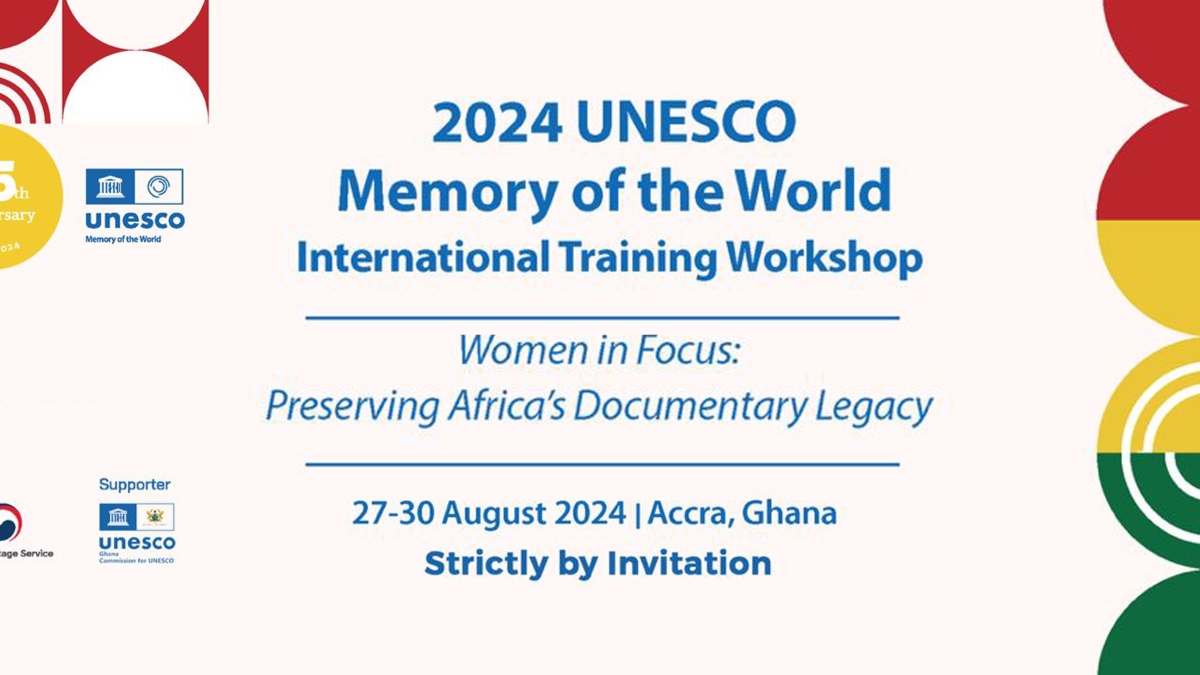- Login to ASPnet | Ghana Commission for UNESCO | Government Agency Responsible for the coordination of Ghana's contributions to and presence at UNESCO
Ghana hosts UNESCO Memory of the World Program International Training Workshop from 27-30 August 2024

The Korean National Commission for UNESCO (Secretary-General Kyung Koo Han), in collaboration with the Korea Heritage Service (Director Eung-Chon Choi) and the Ghana Commission for UNESCO (Secretary-General Ama Serwah Nerquaye-Tetteh), will host the “2024 UNESCO Memory of the World International Training Workshop” in Accra, Ghana, from August 27 to 30, 2024.
The UNESCO Memory of the World Programme has been operating since 1995 with the goal of preserving humanity’s diverse documentary heritage and sharing it with people across the globe. As of August 26, 2024, a total of 496 items from 129 countries and 9 organizations worldwide have been inscribed on the Memory of the World Register. However, despite Africa comprising 54 countries (representing over 30% of UNESCO’s 194 member states), only 35 items from African countries are listed as Memory of the World heritage items. In contrast, Europe and North America account for 258 documentary heritage, representing more than half of all documentary heritage inscribed globally.
The Memory of the World Register items are selected after a thorough review process by the national Memory of the World Committees and subsequent preliminary and final evaluations by UNESCO’s International Advisory Committee (IAC). The regional imbalance in the number of inscriptions is not due to the lack of value in African documentary heritage or any cultural inferiority compared to Europe. Rather, it stems from a lack of “know-how” in drafting nomination documents that meet the stringent standards required by UNESCO. Many African member states face challenges navigating the complex process needed to nominate and register their documentary heritage under the Memory of the World Programme. Since the first list was initiated in 1997, 804 nominations dossiers have been submitted globally, with only a 60% success rate.
Since 2009, the Korean National Commission for UNESCO has been organizing workshops aimed at providing training for developing countries to effectively prepare nomination dossiers. These applications must highlight the significance of the records and provide justification for their preservation according to the Memory of the World inscription criteria. To date, 127 countries have participated in the workshop, and as a direct result, 11 documentary heritage items from these countries have been successfully registered in the international registers, while 13 have been listed in regional registers.
One of the major benefits of these workshops is that participants receive direct advice and mentorship from current and former reviewers of the Memory of the World Register. These experts, who have been involved in UNESCO’s Memory of the World Program, provide invaluable insights that significantly improve the chances of successful registration.
The competition for participation in the workshop has intensified, with 32 countries submitting applications this year. After a thorough screening process, 11 countries were selected to participate, including Ghana, Namibia, Nigeria, Lesotho, Malawi, Senegal, Eswatini, Uganda, Cape Verde, Côte d’Ivoire, and Tunisia.
This year’s workshop, marking the 15th edition of the event, has been specially designed to align with UNESCO’s global priorities of “gender equality” and “Africa.” The program will feature special lectures and discussions on topics such as Memory of the World in Africa: Current Struggles and Future Directions” and Memory of the World and Women, Beacon for the Future”. Additionally, participants will receive personalized guidance on their registration applications from prominent experts, including Jan Bos, Chair of the International Advisory Committee for the Memory of the World, Joie Springer, a member of the Memory of the World Register Subcommittee, and Kyung-ho Suh, Professor Emeritus at Seoul National University.
Kyung Koo Han, Secretary-General of the Korean National Commission for UNESCO, highlighted the significance of the workshop, stating, “The UNESCO Memory of the World International Training Workshop is the only project of its kind dedicated to building the capacities of the UNESCO Member States in the field of the Memory of the World Programme. Drawing on the expertise and experience accumulated over the past 15 years, we aim to further enhance our skills in the field of documentary heritage, strengthen our collaboration with international experts, and expand Korea’s role in supporting developing countries in their efforts to register documentary heritage with UNESCO.”
He added, “We are committed to ensuring that this program continues to grow, contributing not only to the preservation of global documentary heritage but also to fostering a deeper understanding of the importance of these items in reflecting the diverse histories and cultures of humanity.”
